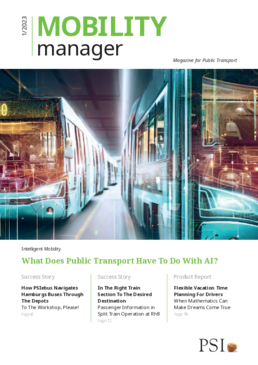Torsten Vogel and Robert Baumeister, Managing Directors of PSI Transcom GmbH, provide an initial outlook on the new financial year and the topics that will play an important role for public transport in the coming 12 months.
Emission-free fleets, cost optimisation, a shortage of skilled workers and increasing passenger satisfaction will continue to be challenging issues for transport companies in 2024. Which of these tasks do you consider to be the most urgent?
Torsten Vogel: For an initial outlook, we need to look back over the past few months. Anyone who uses public transport such as buses or trains will have noticed: The vehicles are overcrowded and numerous journeys have been cancelled.
The main reason: the ongoing shortage of skilled labour. There are not enough staff available to carry out all the journeys planned in the operating schedule. The lack of suitable staff for regular operations has a direct impact on passenger satisfaction.
One way to counteract the shortage of skilled labour is to increase employee satisfaction. Particularly in connection with the staff shortage, this is another important lever for operational processes.
An additional lever is the use of software-supported systems to automate and optimise operational processes despite staff shortages. I think the shortage of skilled labour will remain the biggest and most urgent challenge for transport companies in 2024.

What developments can still be expected for public transport in 2024 and which topics will be driven forward?
Robert Baumeister: In 2024, we are seamlessly building on the developments of recent years. The core issues that will continue to occupy public transport are the transport transition and, in particular, the interplay between the mobility and climate-neutral drive transition. These processes are closely interlinked and the use of information technologies, such as software solutions for the digitalisation of operational processes, digital passenger information systems or digital solutions for operational personnel scheduling, is absolutely essential.
I am convinced that the turnaround in public transport can only be optimally driven forward if, on the one hand, there are more attractive and networked services for future passengers and, on the other hand, the burden on transport companies is reduced in terms of personnel. This in turn requires considerable investment in many areas of a transport company.
How can transport companies master this diversity of topics and still successfully transform themselves?
Robert Baumeister: The ability to master complexity is quite complex. For transport companies, the first step is to identify their own operational processes and describe the possibilities of digitalisation. Every new software-supported system that is introduced to reduce the complexity of operational processes initially increases this complexity.
This is because the various interfaces that the systems bring with them initially lead to an increase in complexity in the IT infrastructure. To ensure that the transformation nevertheless succeeds and that software-supported systems remain manageable in the long term, consistent modularisation and the use of standardised interfaces with simultaneous transparent monitoring of data flows is essential. The quality of the data at each system interface determines the quality of the overall solution.
In my opinion, modern data platforms will therefore become increasingly important and facilitate the organisational transformation of transport service providers.

Are software solutions for workforce scheduling or automated driving suitable solutions to counteract the shortage of skilled labour and increase employee satisfaction?
Torsten Vogel: The shortage of skilled labour affects almost all sectors of the economy. Almost all industries are facing these challenges today and will continue to do so in the future. A higher degree of automation that supports the company's own staff can certainly be a partial solution. Fully automated solutions, such as autonomous driving, still face a number of regulatory challenges and must first gain the necessary acceptance from users.
The use of IT systems in human resources management supports personnel planning on the one hand and increases employee satisfaction on the other, as the needs of employees can be better catered for.
A good example: the PSItraffic operations management system. It ensures that the workshop supervisors are also highly efficiently integrated into operations during the day. Unattractive night shifts are reduced as staff are also increasingly deployed in the workshops during the day. In the best-case scenario, a higher degree of digitalisation in workforce scheduling leads to optimised operational processes, relieves the burden on employees and enables more offers for modern working time models.
To summarise, it can be said that the use of software in many areas plays a central role for transport companies in combating the shortage of skilled workers. At the same time, the amount of support required is increasing, as trained personnel are needed to use and maintain the software. For transport companies, this means an increasing shift in the demand for skilled labour towards IT specialists and an even greater involvement of solution providers in order not to lose sight of the actual core business.
Generative artificial intelligence such as the use of large language models (LLMs) or cloud solutions also open up completely new fields of application for public transport companies. What potential applications do you see?
Robert Baumeister: I see exciting new approaches in two business areas of transport service providers, among others: Generative AI in organisational knowledge and scheduling management.
What are large language models (LLMs)?
A large language model is a special type of artificial intelligence that has been trained on large amounts of text to understand existing content and generate new content. Gartner Glossary
In knowledge management, the use of generative AI helps to process the organisation's knowledge more quickly and make it accessible to all employees. This approach is particularly effective in light of the aforementioned shortage of skilled labour. New employees need to be trained quickly and efficiently. The time required to build up knowledge within an organisation is dramatically reduced. AI and interactive systems reduce the familiarisation time. Chatbots replace extensive manuals, for example, or voice controls replace complex menus.
In scheduling management, an AI-supported suggestion system provides more security for employees. In particular, AI supports actions and decisions when scheduling interventions are required in the event of a malfunction. The software also helps to compensate for a lack of experience, especially for new employees. The response times of operational dispatchers are becoming shorter and shorter due to the increasing number of journeys and disruption situations "build up" more quickly. The integration of AI makes the systems more stable and reliable.

![[Translate to English:] Geschäftsführer PSI Transcom GmbH [Translate to English:] Geschäftsführer PSI Transcom GmbH](/fileadmin/_processed_/c/d/csm_geschaeftsfuehrer-psi-transcom_eeb59358d6.jpg)
